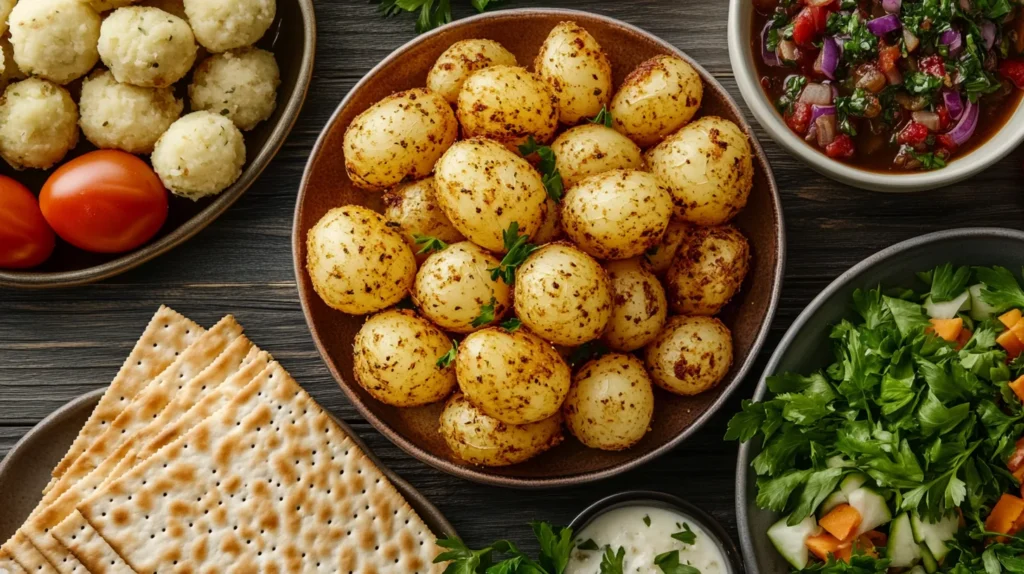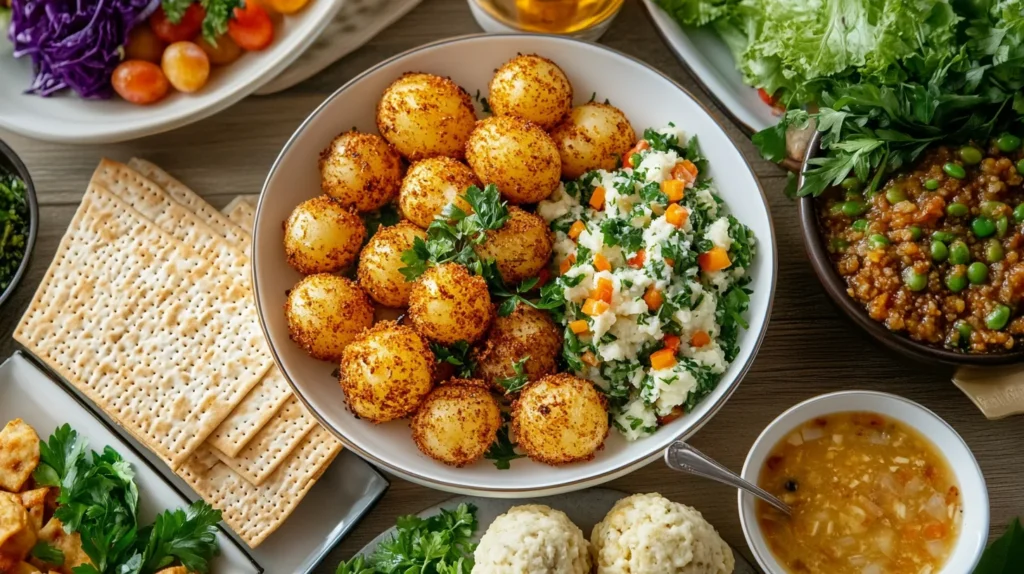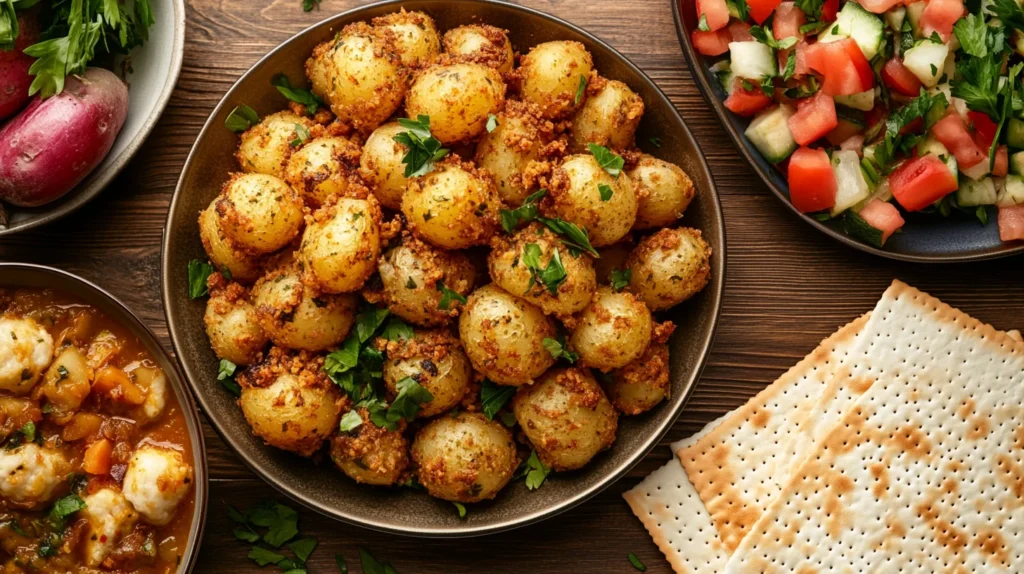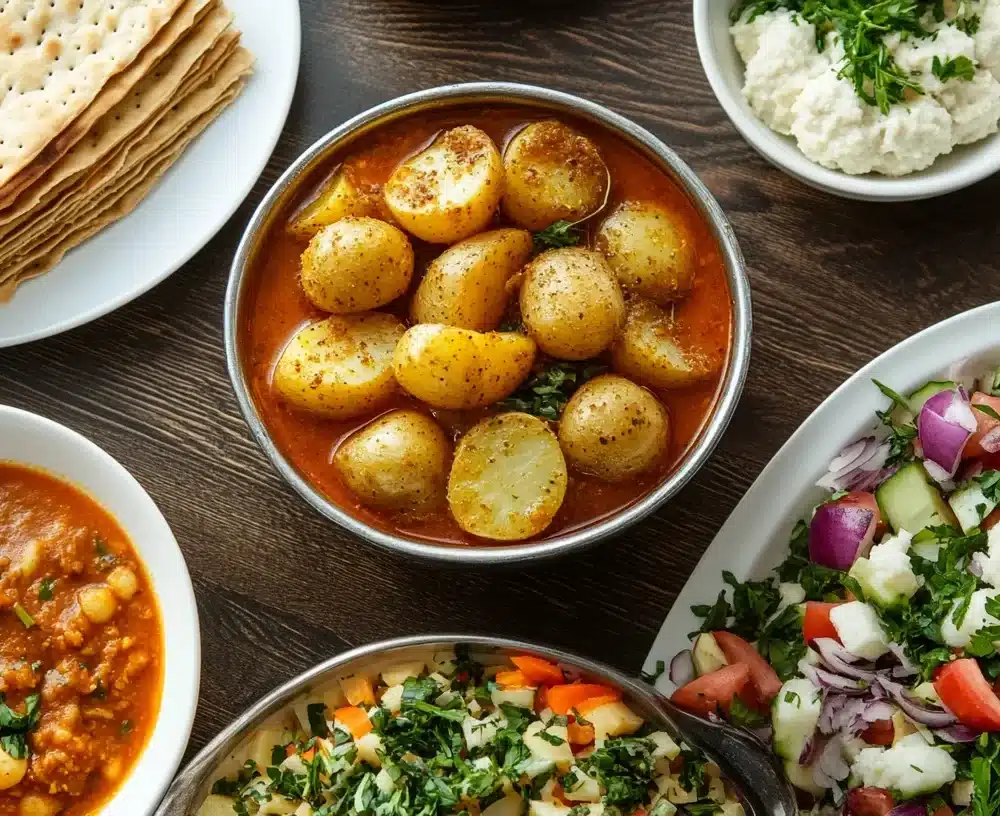Passover: Can Jews Eat Potatoes? Recipes and Tips
Passover: Can Jews Eat Potatoes? Recipes and Tips is a question that arises during the Jewish holiday. The significance of Passover is profound, marking the liberation of the Israelites from slavery in Egypt. This celebration involves many customs, including specific dietary restrictions known as Chametz, which can make meal planning challenging. In this article, we will explore the role of potatoes in Jewish cuisine, their classification within the dietary laws of Passover, and delicious recipes and tips for incorporating potatoes into your Passover meals.
Understanding Passover and Dietary Restrictions
Passover holds immense significance within Judaism. It commemorates the Exodus, the freeing of the Hebrew people from Egyptian bondage, and serves as a reminder of their journey to freedom. This holiday typically lasts eight days, with the first two and last two days observed as full holidays where work cannot be performed.
During this time, Jewish families gather for the Seder meal, a ritual feast that includes reading from the Haggadah, which tells the story of the Exodus. One of the critical aspects of Passover observance is adhering to dietary laws, particularly the prohibition against Chametz.
Overview of Passover Significance in Judaism
The essence of Passover lies in its central themes of freedom, redemption, and faith. The act of retelling the story of the Exodus binds generations of Jewish people together, creating a sense of shared identity and culture. The Seder meal itself is rich with symbolism—each food item on the Seder plate represents a part of the narrative, fostering reflection and gratitude for one’s freedom.
Understanding the historical context of Passover enhances the experience. It connects modern Jews to their ancestors who longed for liberation, serving as a poignant reminder of resilience and hope against oppression. As such, the customs and practices during this time are not merely ritualistic but deeply rooted in the collective memory of a people.
Explanation of the Dietary Laws During Passover (Chametz)
The dietary restrictions during Passover revolve primarily around the concept of Chametz, which refers to any leavened product derived from five specific grains: wheat, barley, rye, oats, and spelt. These grains, when mixed with water and allowed to ferment, create bread or other leavened products, which cannot be consumed during Passover.
In preparation for the holiday, homes undergo a thorough cleaning to rid them of any Chametz remnants, ensuring that all foods served during the Seder comply with kosher-for-Passover standards. Often, individuals and families will use special dishes and utensils designated exclusively for Passover to maintain this separation.
Definition of Chametz and Its Implications for Food Choices
Chametz’s definition extends beyond mere bread. It encompasses any food product that contains these grains and has been allowed to rise. This comprehensive ban significantly impacts what is served during Passover, leading to creative culinary adaptations among Jewish communities.
The need to avoid Chametz prompts experimentation with alternative ingredients, resulting in unique variations of traditional dishes. While flour-based items are off-limits, there is an opportunity for exploration through the use of potatoes and other non-grain vegetables, fostering a diverse array of flavors and textures during meals.
The Role of Potatoes in Jewish Cuisine
Potatoes have carved out a prominent place in Jewish cooking, especially during Passover. Their versatility and availability make them a staple ingredient in numerous traditional dishes.
Historically, potatoes entered Jewish kitchens in Europe during the 18th century and quickly became a primary carbohydrate source, providing sustenance during times of scarcity. Their adaptability allows cooks to prepare various dishes, from savory to sweet, making them indispensable in Jewish culinary traditions.
Historical Context of Potatoes in Jewish Cooking
The introduction of potatoes in Jewish cuisine coincided with significant shifts in Eastern European dietary patterns. As grains became scarce or unaffordable, many Jewish households began to rely heavily on potatoes as their primary starch.
Moreover, during the shtetl days, potatoes provided a way to create hearty meals without expensive ingredients. Dishes like Potato Kugel and Latkes emerged, integrating easily into holiday menus. The potato’s ability to absorb flavors and complement various seasonings further solidified its status in Jewish cooking.
Cultural Significance of Potatoes Among Jewish Communities
Beyond sustenance, potatoes carry cultural significance. They serve as a symbol of adaptability and resourcefulness, reflecting the immigrant experience of many Jewish families.
For many, cooking with potatoes evokes nostalgia, connecting generations through time-honored recipes. As families gather around the Seder table, sharing familiar dishes like mashed potatoes or roasted potatoes reinforces family bonds and cultural identity while celebrating the freedom commemorated during Passover.
Nutritional Benefits of Potatoes
Nutritionally, potatoes offer several benefits, making them an essential ingredient in Passover meals. Rich in vitamins C and B6, potassium, and fiber, potatoes provide necessary nutrients while being naturally low in calories.
Including potatoes in a Passover menu can help create balanced meals that satisfy, offering comfort and nourishment. Additionally, their versatility allows for creative culinary applications, ensuring they remain relevant in contemporary Jewish cooking.
Are Potatoes Considered Chametz?
A common question regarding Passover is whether potatoes are considered Chametz. Understanding the classification of potatoes in relation to the dietary laws of Passover is crucial for meal planning.
Clarification on the Classification of Potatoes During Passover
Potatoes do not fall under the category of Chametz since they are not one of the five specified grains. Therefore, they are deemed permissible for consumption during Passover, making them an excellent option for those looking to adhere to the dietary rules while still enjoying flavorful meals.
This clarification is vital for families preparing their Passover menus. Potatoes can freely take center stage in various dishes, allowing for creativity and variety without concern over violating kosher-for-Passover guidelines.
Comparison with Other Starchy Foods (Grains, Legumes)
In contrast to grains, legumes also have a nuanced standing during Passover. Some authorities permit certain beans and lentils, while others strictly prohibit their consumption, labeling them as kitniyot.
For example, rice falls under the kitniyot category but is often accepted by Sephardic Jews, while Ashkenazi Jews traditionally refrain from consuming it. Potatoes, however, enjoy widespread acceptance across different Jewish traditions, allowing them to shine as a reliable starch throughout the holiday.
Expert Opinions on Potato Consumption During Passover
Rabbinical opinions generally support the consumption of potatoes during Passover, emphasizing their status as a non-grain food. Many rabbis encourage embracing potatoes’ versatility, enabling families to enjoy a breadth of dishes throughout the holiday.
Consulting a rabbi or trusted authority can provide additional insight, particularly for those who may have specific concerns or unique dietary needs. Seeking guidance ensures adherence to Passover laws while exploring the delightful culinary possibilities potatoes offer.

Popular Potato Dishes for Passover
Potatoes lend themselves well to a variety of traditional dishes that can elevate any Passover meal. Familiar favorites and innovative takes on classic recipes ensure delicious options for every palate.
Overview of Traditional Potato Recipes
Some of the most beloved potato dishes served during Passover include Potato Kugel, Hash Browns, and Mashed Potatoes. Each of these dishes boasts its unique preparation methods and flavor profiles, contributing richness to the Seder table.
These dishes not only honor tradition but also allow families to engage in friendly competition over who can create the best version. Such culinary contests add an element of fun and bonding to the holiday meal experience.
Details on Classic Dishes Such as Potato Kugel and Mashed Potatoes
Potato Kugel, a savory baked casserole, is renowned for its crispy edges and tender center. Made from grated potatoes, onions, and eggs, it’s seasoned simply yet Italian in its appeal.
Mashed Potatoes, on the other hand, promise comfort with their creamy texture and buttery flavor. Whether prepared plain, garlicky, or adorned with herbs, they serve as a familiar favorite that brings joy to the table.
Innovative Twists on Potato Recipes Suitable for Passover
Creative cooks often experiment with potatoes, infusing them with new flavors and techniques. For instance, Herb-Roasted Potatoes provide a vibrant presentation, featuring a medley of herbs, garlic, and olive oil that enhances their natural taste.
Similarly, Sweet Potato Latkes offer a twist on the classic recipe, adding a hint of sweetness and color. These variations keep traditional recipes alive while allowing room for personal touches and preferences in each family’s Passover menu.
Preparing Potatoes for Passover
Proper preparation of potatoes is key to ensuring they are Kosher for Passover. From selection to cooking method, understanding best practices ensures successful outcomes in your dishes.
Best Practices for Selecting and Washing Potatoes
When selecting potatoes, look for firm, unblemished specimens free from sprouts or green spots. Varieties like Yukon Gold or Russet potatoes perform well in various dishes and are easy to prepare.
Before cooking, thoroughly wash potatoes to remove any dirt or residue. Scrubbing them under running water is advisable, as this step ensures cleanliness and helps eliminate potential contaminants.
Tips for Peeling and Cutting Potatoes
Peeling potatoes can be done using a vegetable peeler or knife, depending on personal preference. However, consider leaving the skins on for certain recipes, as they contain beneficial nutrients and add texture.
When cutting potatoes, uniform sizes will promote even cooking. Whether diced, sliced, or shredded, aim for consistency for the best results in your dishes.
Guidelines for Proper Cooking Methods to Ensure Kosher-for-Passover Status
Cooking potatoes in a kosher-for-Passover manner involves using dedicated cookware and utensils. This practice prevents cross-contamination with Chametz and adheres to the dietary restrictions of the holiday.
Methods such as boiling, baking, and frying are all acceptable for preparing potatoes. Using kosher-for-Passover oils, like olive or canola oil, adds another layer of compliance while enhancing flavor.

Creative Potato Recipes for Passover
Bringing creativity to your Passover table can elevate the dining experience, making each dish memorable. Here are some delightful potato recipes to inspire your holiday cooking.
Recipe 1: Classic Potato Kugel
Ingredients:
- 5 large potatoes
- 1 onion
- 4 eggs
- 1/4 cup matzo meal
- Salt and pepper to taste
- Oil for greasing the pan
Instructions:
- Preheat your oven to 375°F (190°C).
- Grate the potatoes and onion, then squeeze out excess moisture.
- In a mixing bowl, combine grated potatoes, onion, eggs, matzo meal, salt, and pepper.
- Grease a baking dish with oil and pour the mixture into it.
- Bake for 45-60 minutes until golden brown and crispy on top.
Notes: Potato Kugel is versatile; feel free to add spices or herbs to customize flavors.
Recipe 2: Garlic Mashed Potatoes
Ingredients:
- 4 large potatoes
- 4 cloves garlic
- 1/2 cup chicken or vegetable broth
- 1/4 cup olive oil
- Salt and pepper to taste
Instructions:
- Boil potatoes and garlic cloves until soft.
- Drain and return to the pot.
- Mash using a potato masher, gradually adding broth and olive oil.
- Season with salt and pepper before serving.
Notes: For a richer flavor, consider incorporating roasted garlic instead of boiled.
Recipe 3: Herb-Roasted Potatoes
Ingredients:
- 2 pounds baby potatoes
- 1/4 cup olive oil
- 2 tablespoons fresh rosemary, chopped
- 2 tablespoons fresh thyme, chopped
- Salt and pepper to taste
Instructions:
- Preheat your oven to 425°F (220°C).
- Toss baby potatoes with olive oil, herbs, salt, and pepper.
- Spread evenly on a baking sheet and roast for 30-35 minutes until crispy.
Notes: Experiment with different herbs according to preference for a personalized touch.
Recipe 4: Potato Latkes
Ingredients:
- 4 large potatoes
- 1 onion
- 2 eggs
- 1/4 cup matzo meal
- Salt and pepper to taste
- Oil for frying
Instructions:
- Grate potatoes and onion, then squeeze out excess moisture.
- Combine grated vegetables with eggs, matzo meal, salt, and pepper.
- Heat oil in a skillet and drop spoonfuls of batter into the hot oil.
- Fry until golden brown on both sides, draining on paper towels.
Notes: Serve with applesauce or sour cream for a traditional touch.
Substitutes for Potatoes During Passover
While potatoes are widely accepted during Passover, some individuals may wish to explore alternatives due to dietary preferences or restrictions.
Alternatives for Those Avoiding Potatoes
For those avoiding potatoes, there are plenty of wholesome substitutes available that still align with Passover dietary laws. Cauliflower, zucchini, and carrots are excellent options that can mimic the base of traditional potato dishes.
Each of these alternatives can be prepared in similar ways to potatoes, allowing for familiar recipes without compromising dietary choices.
Overview of Other Vegetables That Can Be Used
Root vegetables like parsnips and turnips are also great candidates for substitution. Their earthy flavors and adaptable textures lend themselves to a variety of preparations, from mashes to roasts.
Experimentation with seasonal vegetables can yield delightful results, providing opportunities for creativity while maintaining the spirit of the holiday.
Suggestions for Creative Recipes Using Substitutes
Consider preparing cauliflower mash with garlic and herbs for a creamy side dish or zucchini fritters as a lighter alternative to latkes.
Roasting root vegetables alongside traditional herbs can create flavorful medleys that enhance festive meals. Incorporating colorful vegetables can elevate the visual appeal of the Seder table while remaining compliant with dietary restrictions.

Tips for Hosting a Passover Seder with Potatoes
Hosting a Passover Seder requires thoughtful planning and preparation to create a meaningful and enjoyable experience for guests. Incorporating potatoes can enhance the meal’s flavor profile while honoring tradition.
Menu Planning Incorporating Potatoes
When developing a menu, consider how potato dishes can complement other offerings. Balancing flavors and textures will create a harmonious dining experience.
For instance, pairing crispy potato latkes with a refreshing salad can create a delightful contrast, while smooth garlic mashed potatoes can serve as a comforting accompaniment to a savory meat dish.
Ideas for Balancing Flavors and Textures in the Meal
Aim to create a variety of textures in your dishes. Combining roasted potatoes with soft kugels offers a pleasing interplay while engaging diners’ senses through contrasting elements.
Don’t shy away from experimenting with flavors; adding spices or herbs to your potato dishes can elevate their taste and introduce exciting new dimensions.
Making Accommodations for Guests with Dietary Restrictions
It’s essential to inquire about any dietary restrictions your guests may have. Providing options for vegetarians or gluten-free diners ensures everyone feels included in the meal.
Offering potato dishes along with alternative vegetable options allows you to cater to various preferences while maintaining the festive spirit of the Seder.
Common Questions About Potatoes and Passover
As Passover approaches, many questions arise surrounding potato consumption and adherence to dietary laws. Addressing these inquiries can provide clarity and guidance for those navigating the holiday.
FAQ Section Addressing Common Concerns and Misconceptions
Many wonder if frozen potatoes are permissible during Passover. Generally, frozen potatoes without additives are acceptable, but checking labels is advisable to ensure compliance with kosher standards.
Another frequent inquiry concerns the use of instant mashed potatoes. Opting for those labeled specifically as kosher-for-Passover provides assurance while simplifying meal preparation.
Clarification on Cooking Methods That Are Kosher-for-Passover
When preparing dishes for Passover, using cookware and utensils that have either never been used for Chametz or have been properly kashered is vital to maintaining kosher compliance.
Additionally, employing proper cooking methods, such as boiling, baking, or frying, ensures that the final dishes align with dietary laws and provide a satisfying meal.
Insights on When to Consult a Rabbi
If uncertainties persist regarding potato consumption or other dietary concerns, consulting a rabbi or knowledgeable authority can provide valuable guidance.
Engaging with religious leaders fosters a deeper understanding of Passover laws, offering insights tailored to individual circumstances while ensuring respectful observance of the holiday.
Conclusion
Navigating the culinary landscape of Passover can be rewarding and enriching. Understanding the role of potatoes, their nutritional value, and their exemption from Chametz provides flexibility in meal planning while honoring tradition.
From crafting beloved classics like Potato Kugel to exploring innovative variations, potatoes can be a delightful centerpiece of the Seder table. Moreover, knowing how to prepare and accommodate dietary needs fosters an inclusive and joyous celebration.
Ultimately, Passover: Can Jews Eat Potatoes? encapsulates not only the importance of complying with dietary laws but also the spirit of creativity and connection that defines the holiday. Embrace the legacy of tradition while allowing space for culinary exploration, and create cherished memories around the table with loved ones during this meaningful time.
For more recipe ideas, including creative potato dishes, visit Chabad.org
For more recipe ideas, including creative potato dishes, visit WhizzyRecipes.com for delicious and easy-to-make options perfect for any gathering.
Print
Passover: Can Jews Eat Potatoes? Recipes and Tips
Description
Recipe 1: Classic Potato Kugel
Classic Potato Kugel is a comforting, savory dish with crispy edges and a tender interior, often served during Jewish holidays like Passover. It is made from grated potatoes, onions, and eggs, and baked to perfection.
Recipe 2: Garlic Mashed Potatoes
Garlic Mashed Potatoes are creamy and rich, with the perfect blend of garlic flavor. This dish is a crowd-pleaser, offering a smooth and velvety texture to complement any main course
Recipe 3: Herb-Roasted Potatoes
Herb-Roasted Potatoes are crispy, golden, and full of flavor, thanks to the perfect combination of rosemary and thyme. They are roasted to perfection, making them a delightful side dish for any meal.
Ingredients
Classic Potato Kugel:
- 4 large potatoes (peeled and grated)
- 1 onion (finely chopped)
- 3 large eggs
- ¼ cup olive oil or melted chicken fat (schmaltz)
- 1 tsp salt
- 1 tsp pepper
- ½ tsp garlic powder (optional)
Garlic Mashed Potatoes:
- 5 large potatoes (peeled and diced)
- 3 cloves garlic (peeled)
- ¼ cup olive oil or kosher-for-Passover butter
- Salt to taste
- Freshly ground pepper to taste
- ½ cup chicken or vegetable broth (kosher for Passover)
Herb-Roasted Potatoes:
- 2 lbs baby potatoes (cut into halves or quarters)
- 2 tbsp olive oil
- 2 tsp dried rosemary
- 1 tsp dried thyme
- Salt and pepper to taste
Instructions
Classic Potato Kugel:
- Preheat the oven to 375°F (190°C).
- Grate the potatoes and onion, then squeeze out excess liquid using a cheesecloth or towel.
- In a large bowl, combine grated potatoes, onions, eggs, olive oil, salt, pepper, and garlic powder.
- Grease a baking dish and pour the mixture into it.
- Bake for 60 minutes, until golden brown and crispy on top.
Garlic Mashed Potatoes:
- Boil the diced potatoes and garlic cloves in salted water until tender (about 15 minutes).
- Drain the potatoes and garlic, then return them to the pot.
- Mash the potatoes and garlic with olive oil or butter until smooth.
- Stir in the broth, salt, and pepper. Adjust seasoning as needed.
- Serve hot with additional olive oil or chopped parsley for garnish.
Herb-Roasted Potatoes:
- Preheat the oven to 400°F (200°C).
- Toss the potatoes with olive oil, rosemary, thyme, salt, and pepper in a large bowl.
- Spread the potatoes evenly on a baking sheet.
- Roast for 30-35 minutes, flipping halfway through, until golden brown and crispy.
Notes
- Classic Potato Kugel: Can add matzo meal for texture, but make sure it’s kosher for Passover.
- Garlic Mashed Potatoes: Can substitute dairy-free butter for a non-dairy option.
- Herb-Roasted Potatoes: Garnish with fresh parsley for added flavor.
Details:
| Detail | Classic Potato Kugel | Garlic Mashed Potatoes | Herb-Roasted Potatoes |
|---|---|---|---|
| Prep Time | 10 minutes | 10 minutes | 10 minutes |
| Cook Time | 60 minutes | 20 minutes | 35 minutes |
| Total Time | 70 minutes | 30 minutes | 45 minutes |
| Yield | 4 servings | 4 servings | 4 servings |
| Category | Side Dish | Side Dish | Side Dish |
| Method | Baking | Boiling, Mashing | Roasting |
| Cuisine | Jewish, Kosher | Jewish, Kosher | Jewish, Kosher |
| Diet | Kosher for Passover | Kosher for Passover | Kosher for Passover |
Nutrition (per serving):
| Nutrient | Classic Potato Kugel | Garlic Mashed Potatoes | Herb-Roasted Potatoes |
|---|---|---|---|
| Serving Size | 1/4 of recipe | 1 serving | 1 serving |
| Calories | 210 | 200 | 180 |
| Sugar | 2g | 1g | 1g |
| Sodium | 380mg | 210mg | 250mg |
| Fat | 12g | 10g | 8g |
| Saturated Fat | 2g | 1g | 1g |
| Unsaturated Fat | 7g | 6g | 5g |
| Trans Fat | 0g | 0g | 0g |
| Carbohydrates | 22g | 24g | 25g |
| Fiber | 2g | 3g | 3g |
| Protein | 4g | 3g | 4g |
| Cholesterol | 30mg | 0mg | 0mg |

